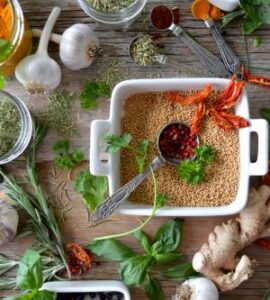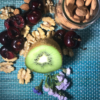 Reading Time: 9 minutes
Reading Time: 9 minutesBy Faye and Sarah
Does anyone else suddenly feel the urge to take care of your health and immune system a little better? WE DO! There is nothing like a global pandemic of a very contagious virus such as COVID-19 to get us all talking about health!
This article is the first in a series of blogs about supporting your immune system beyond the basic measures of handwashing and self-isolation.
Our goal at Weight In Mind is and has always been simple, to help people to make lasting changes to their lifestyle, behaviour, and habits that help them achieve good health and ideal weight. We teach people how to create a healthy living strategy.
Our health status is thankfully largely influenced by how we live and how we choose to behave, so now may be a good time to adapt your behaviours and start learning more about how you can invest time and energy in your health with good food and nutrition.
PLEASE NOTE:
The information in this article is for educational purposes only and should not be construed as medical advice or personal nutrition recommendations.
Our Immune Resilience
The immune system is the key mediator between our bodies and invading pathogens. Our immune system and level of resilience to immune challenges is powerfully connected to and influenced by our nutritional status, physical fitness and emotional environment.
So if we know our nutrition and lifestyle influence the immune system it makes total sense to have an awareness of these factors and make efforts to keep ourselves in top form.
When it comes to immunity the health of the host may be more important than the disease itself. Think about it, why do some people get sick and not others? And why does the same person in one moment of their life seem to pick up all the bugs and in other moments doesn’t get anything at all? Why do some people experience mild symptoms and others more severe?
There are of course important factors that determine a person’s vulnerability to or resilience to picking up a bug or developing a chronic health condition. And those factors are very often things within our control such as food, nutrition, mindset, fitness and sleep.
Holding the Fort – Healthy Barriers
Areas of the body such as the digestive tract, respiratory tract and oral cavity are barriers. They are the physical protective barrier between the inside of the body and the outer world.
Barrier defences are part of the body’s most basic defence mechanisms. Our barriers are part of the innate immune system.
On a daily basis, we are exposed to an enormity of microbes and it is the immune system’s job to identify friend from foe and respond accordingly.
In the event of contact with a microbe that can cause disease, it is the work of the immune system, at the barrier to initiate a response and defend us. This is why the barriers are so important in terms of our immune tolerance and competence.
Some aspects of our barrier defences are:
- The microbiome (the body’s collection of bacteria, viruses, fungi, and other organisms). It has a fundamental role in immunity because it communicates with immune cells telling the inside what’s going on in the outside world and directing and informing immune responses.
- Chemical barriers like stomach acid, mucus, tears, and saliva all contain substances ready to act on invaders.
- Epithelial cells and tight junctions monitor what gets through the barrier into the bloodstream, when healthy, they hold the fort and guard the gates between inner and outer worlds.
Healthy barriers include:
- A diverse and balanced microbiome.
- An effective chemical barrier. (e.g. Stomach acid production involves adequate nutrients such as zinc and B vitamins).
- And a healthy gut lining.
Here are 6 tips for Healthy” Barriers” through food.
- Plant-based whole food diet
- Food diversity
- Reduce sugar and refined carbohydrates
- Eat probiotic and prebiotic foods
- Eat concentrated superfoods
- Make and eat broth
So where do we begin with implementing these? At weight In Mind, we focus on helping people move from knowing to doing – how you can create the behaviour and habit changes that will get you moving towards better health by focusing on good food.
Food Glorious Food!
As Hippocrates said food is medicine. So it makes sense to use this time to nurture some better eating habits. If immune competence is closely linked to nutritional status, fresh whole food is a good place to start. Real food is literally the source of thousands of substances that allow our bodies to perform and function well.
So what can we all do in our kitchens to support healthy barriers?
Eat Tons of Veg
 A “plant-based wholefoods diet” to us means simply to eat lots and lots of vegetables as the main basis of your plate, alongside healthy fats and good quality protein sources. Of course, in general, eating plenty of vegetables is good practice, and we’re not talking 5 a day, but more like 7 – 10 a day, not including fruit! We recommend 1 – 2 portions of fruit max on top of your 7-10 veggies. So a meal would include 3-5 portions of vegetables, a portion being something like a small palm-size.
A “plant-based wholefoods diet” to us means simply to eat lots and lots of vegetables as the main basis of your plate, alongside healthy fats and good quality protein sources. Of course, in general, eating plenty of vegetables is good practice, and we’re not talking 5 a day, but more like 7 – 10 a day, not including fruit! We recommend 1 – 2 portions of fruit max on top of your 7-10 veggies. So a meal would include 3-5 portions of vegetables, a portion being something like a small palm-size.
We prefer fresh over frozen and frozen over canned, look for vegetable box deliveries as well as supermarket offerings. The more veggies you eat, the more vitamins, minerals, antioxidants, phytonutrients, and pre and probiotics are entering your system, which is great for your gut health and maintaining barrier health and good defences.
Diversity means including variety in your diet. In terms of your behaviour change that means don’t just click the same online order every week or throw the usual suspects into your basket, it means trying lots of different foods every week and a wide variety within each meal. A decent salad and homemade dressing, for example, might have 10+ different ingredients, including herbs, seeds, nuts or even fruit on top of your usual favourite leaves and salad staples.
How To Eat More Veg?
Quick wins to incorporate more vegetables are soups (by adding a portion of healthy soup to your lunch or dinner, you could easily be adding 3 – 4 portions of veg!
Add a super side salad to your meals, keep it simple, just grate or chop whatever you have into a bowl such as carrots, beetroot, fennel, apple, courgette, add lettuce and rocket and you have an extra 6 different varieties.
Think about stir fry’s – slice a whole bunch of veggies to roughly the same size (courgettes, onions, peppers, broccoli, green beans, carrots) and quickly stir fry them in coconut or olive oil with lots of grated garlic and ginger with a splash of good soy sauce and a large sprinkling of coriander and you have an easy quick nutritious meal.
Make a vegetable frittata (gently fry onions, garlic for a couple of minutes, add in sliced mushrooms, allow them to cook for another two minutes, then add lots of spinach fresh or frozen (if frozen defrost beforehand to remove the water) add in beaten eggs and a sprinkle of Himalayan salt and allow to cook slowly.
Currys are excellent as you can add as many vegetables as you like in, the same goes for stews – meat, lots of veg, red wine and bone broth and slow cooking.
Crudites and dips are another simple way of eating more veggies, just make some delicious dips to go with them (cream cheese with spring onions, lots of grated garlic, homemade mayonnaise, hummus, guacamole, pesto with lots of fresh basil).
Eat Garlic, Ginger, Herbs, Spices & Other Superfoods
 Use these concentrated superfoods in addition to your standard veggies as these power foods have antioxidant and immune-supporting properties. Think lemon and lime juice, raw honey, ginger, spices (turmeric, ginger, cloves, cinnamon…), herbs (parsley, thyme, oregano, sage, coriander, basil, rosemary…), maca powder, cocoa powder or green powders like spirulina or wheatgrass, concentrated pomegranate, beetroot or cherry juice.
Use these concentrated superfoods in addition to your standard veggies as these power foods have antioxidant and immune-supporting properties. Think lemon and lime juice, raw honey, ginger, spices (turmeric, ginger, cloves, cinnamon…), herbs (parsley, thyme, oregano, sage, coriander, basil, rosemary…), maca powder, cocoa powder or green powders like spirulina or wheatgrass, concentrated pomegranate, beetroot or cherry juice.
Incorporate some of these foods daily they are nutrient powerhouses and often the magic bullet when looking to add flavour to meals. So great for your health and your taste buds.
How To Eat More Superfoods?
Easy ways to incorporate these foods into your diet could be smoothies, curries, hot drinks, tea.
Smoothies give you the opportunity to fill up on superfoods by adding ingredients such as maca powder, cocoa, turmeric, seeds, coconut oil, protein powders, berries, concentrated cherry juice or greens. Start to build your cupboard ingredients for smoothies.
Make a veggie curry with lots of garlic, ginger, turmeric, cumin, cinnamon and fresh coriander.
Hot drinks can go beyond the classic honey and lemon, grate in or add juiced ginger or turmeric. Add fresh thyme to soothe a cough.
Blend herbs with butter and freeze the mixture in ice cube trays, then store in a box ready to pop into a pan to cook chicken or veggies.
Sauces and dips give you the perfect opportunity to use higher quantities of herbs such as making fresh pesto with tons of basil (basil, olive oil, pine nuts, garlic, parmesan whizz whizz whizz) or guacamole (avocados, lime juice, tons of chopped coriander, and a dash of chilli, garlic and Himalayan salt).
Reduce Refined Carbohydrates & Sugar – With Sugar Swaps
Sugar and highly processed carbs may not be supportive to your microbiome or your immune health. So we suggest you do your absolute best to eat less and swap out the sugar! Here are some ideas:
Make your own healthy cakes and biscuits, for example, opt for a banana bread, where you use bananas for sweetness and almond flour over normal refined flour. Sign up for our upcoming Foodie Friday webinar on how to make healthy delicious sweet stuff! It really takes no time to get a few EASY sweet treat recipes under your belt and into your repertoire.
Make vegetables your new carbs, swap rice for cauliflower rice, spaghetti for spiralised courgette, potato mash for celeriac mash.
Get breakfast cereal off the daily agenda, for snacks or a quick breakfast reach for yoghurt with nuts and fruits, eggs, sweet chia seed pudding, homemade granola (make your own at home from nuts, seeds, coconut oil, and honey), cooked breakfast with lots of veggies, smashed avocado on bakery-fresh gluten-free toast.
Make your sandwich a veggie wrap, use lettuce leaves, cabbage leaves, or even better try nori leaves (the stuff you make sushi rolls with), fill it with your favourite sandwich fillings.
Chocolate Cravings? Have a homemade hot chocolate (try dairy milk alternative heat and mix cacao powder, honey, peanut or almond butter).
Swap the shop bought fruit juice with homemade smoothies or juices. Smoothies include the whole fruit and you can add lots of other superfoods. Try blending 2 of your favourite fruits with coconut water or almond milk. For a smoothie recipe list drop us a message and we will send over some delicious combos. Juicing from scratch makes it easy to add vegetables, try carrot, ginger and orange, beetroot, apple and celery, or cucumber, spinach and lime.
Eat Probiotic & Fermented Foods
On our blog, there are a few good posts about the importance of incorporating fermented foods into your diet including an excellent recipe for fermented garlic. During your enforced time at home why not give it a go, it’s easy, in a few weeks you’ll have little morsels of magic that make eating lots of garlic easy, plus you have the added bonus of fermented foods and their probiotic value.
Quick wins for incorporating more probiotic-containing foods would be to buy full fat natural probiotic yoghurt, or kefir yoghurt, sauerkraut or pickles (just look for a brine solution rather than vinegar and sugar solution in the ingredient list), miso, tempeh, apple cider vinegar, kombucha. Or make homemade sauerkraut which is super simple – grated cabbage, ginger, carrots, garlic and salt – nothing more or less. Massage altogether and store in a glass jar. Keep an eye on our blog for upcoming recipes.
Prebiotics are a type of fiber found in particular foods like onions, Jerusalem artichokes, chicory, garlic, leek, shallots, spring onion, asparagus, beetroot, fennel bulb, green peas, snow peas, sweetcorn, savoy cabbage, chickpeas, lentils, red kidney beans, baked beans, nectarines, white peaches, persimmon, tamarillo, watermelon, grapefruit, pomegranates, dried dates and figs. They are known to be supportive and helpful when building a healthy microbiome by benefiting and feeding the good bacteria. Include a few sources of prebiotic containing foods each day.
Fall In Love With Bone Broth
If there is one thing you can do to support barrier health is to make chicken or meat bone broth. The nutrients found in bone broth help to support a healthy epithelial gut lining and according to several studies chicken soup really can clear nasal congestion as well as thin mucus so there are good reasons why it helps us to feel better when we have a cold or flu virus. It really doesn’t take much to make up batches of broth. All you need are leftover chicken or meat bones or you can buy chicken wings or butchers meat bones and use those. Submerge in water, add onions, carrots, celery, garlic and a dash of lemon juice or apple cider vinegar as that helps to extract the nutrients, and simmer away for at least 6 hours. We like to make this broth with the addition of fennel. There are no hard and fast rules, add in whatever you have.
Once you’ve made your broth you can drink it once a day, or make soups with it, use it as stock for curries, or even add it to stews, shepherds pie. It freezes really well too, so portion it out and pop it in the freezer for a later date.
Bones and connective tissues used to make broth give you glucosamine and chondroitin. Marrow provides vitamin A, vitamin K2, minerals like zinc, iron, boron, manganese and selenium, as well as omega-3 and omega-6 fatty acids. The protein collagen, which turns into gelatin when cooked provides several important amino acids including glutamine.
Glutamine helps maintain the function of the intestinal barrier, as the ingredients simmer, their nutrients are released into the water in a form your body can easily absorb. It’s genius!
If you are interested in learning more about creating a healthy kitchen you can get on the waiting list for our “WIM Kitchen Food for Health” cookery course coming soon or, book a 1-2-1 online cookery lesson and Q&A with our chef Sarah.
If you would just like to talk to us and find out more about what we do from online courses to personalised nutrition, to WIM for healthy organisations, including corporate cookery training and health coaching book in a free 15-minute consultation.







